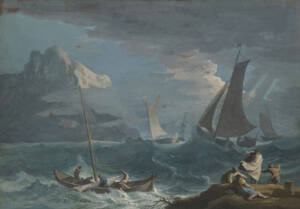
WelCom August 2024
A reflection on unity
James B Lyons
Mark’s Gospel tells of the occasion when, responding to Jesus’ instruction to ‘cross over to the other side’, the disciples ‘took him, just as he was, in the boat; and there were other boats with him’. [Mk 4:35; Jerusalem Bible]
On the crossing they encountered a severe windstorm. Terrified they would drown, the disciples woke the exhausted Jesus and he calmed the storm. ‘And the wind dropped, and all was calm again.’
I’ve often wondered, and perhaps you have too, about ‘the other boats’. They couldn’t have missed the storm. Did the disciples in those boats also cry out in fear? Jesus wasn’t with them, but surely when he calmed the storm they benefitted as well as those who had Jesus in their boat.
My wondering has led me to think of times when I’ve been caught in a storm or witnessed the struggle of others in their storms. Not just the ‘raindrops keep falling’ kind of storm, but emotional hurricanes that rip your confidence, shatter your ability to cope, sap your energy, and drowning seems inevitable.
When normal life is difficult or threatened in some way, reactions are varied from, ‘God, help me!’ to ‘Where is God?’ Disasters provide ammunition for those who deny the existence of God – ‘What sort of God allows terrible things to happen?’
Jesus wasn’t physically present in the other boats, but his concern and his power made his presence felt. Perhaps the faith of the ‘others’ was greater than those who had the ‘real Jesus’ with them. When calm returned Jesus was critical of those in his boat for their lack of faith!
There’s something else here. None of us can have an exclusive claim on Jesus. You cannot confine Jesus to your own boat. He would not abandon those other boats to their fate simply because he wasn’t with them.
The boat that carried Jesus was just a boat. No different from the other boats. It’s not a competition. Jesus is with us all.
Christians have much to offer the world as well as each other by way of healing and cooperation.
As St Peter would preach after he had more fully absorbed the meaning of the Good News, God has no favourites! (Acts 10:34-35)
I was born into a time when, among Christians, we Catholics thought we were the only ones who mattered. In those days, other Christian denominations, such as Anglican, Methodists, Presbyterians, etc, were regarded as breakaways from the Catholic Church and Christian unity would only be achieved when they all became Catholics again!
Fortunately, that perception has no longer any official standing.
It is still important, indeed critical, that we pray for Christian unity. But we are not praying for uniformity.
Members of a community have a united purpose, but they are not clones of one another. They remain individuals with their own characteristics, likes and dislikes. Indeed, those very differences can positively influence and contribute to the strength of the community.
The Second Vatican Council (1962–65) identified the Church as The People of God and in the Apostles’ Creed we proclaim our faith in the holy catholic Church. The small ‘c’ tells us the Church established by Jesus is ‘universal’, not solely the ‘Roman Catholic’ Church.
Christians from various historical backgrounds are in formal dialogue with one another as never before. Often in the past at war with each other, there is now a felt urgency, in this present age of social uncertainty and political upheaval, to highlight what they have in common. Christians have much to offer the world as well as each other by way of healing and cooperation.
Like the ‘many rooms’ Jesus pictures in his Father’s house (John 14:1-6), there are many boats making the journey to the other side. There is life and truth in each of them which is always an assurance of the presence of Jesus.
In a real sense we are all ‘boat people’. How wonderful if, before long, we all found ourselves in the same boat!